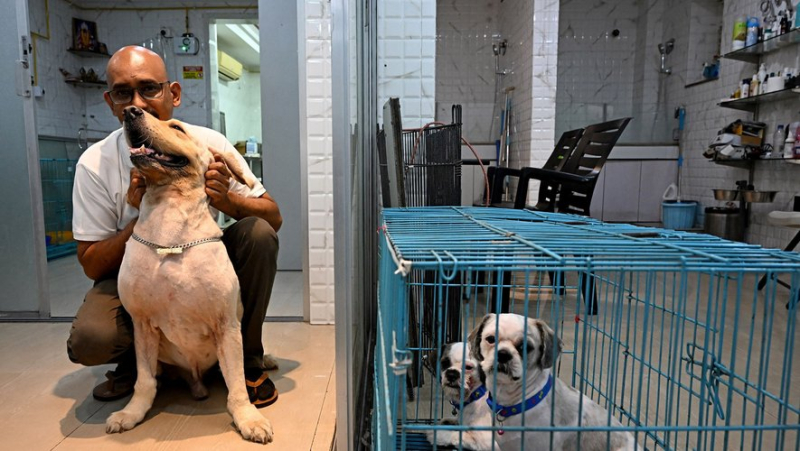“They eat less and have difficulty moving”: why are animals also suffering from the heat wave in Asia ?

“Many animals are hospitalized for three or four days, it takes them a long time to return to normal,” the 57-year-old veterinarian told AFP. DIBYANGSHU SARKAR/AFP
The heat wave raging in India has considerably reduced the activity of a large part of Calcutta, capital of the state of West Bengal, yet veterinarian Partha Das does not remember ;#39;have also been requested.
His veterinary clinic is overwhelmed by pet owners streaming in, concerned about bleeding noses, severe rashes and other symptoms blamed on the scorching heat that is causing much of the disease. South and Southeast Asia for over a week.
"Many animals are hospitalized for three or four days, it takes a long time for them to return to normal", the 57-year-old veterinarian tells AFP. "We receive several cases of sunstroke per day. This is unprecedented", he continues, adding that the heat causes an increase in pathologies linked to dehydration among pets.
Even cats and dogs that are lucky enough to have an owner are susceptible to getting sick. Extreme heat has been gripping Calcutta for several days, with a record temperature of 43 degrees Celsius, the hottest April day since 1954, according to the city's meteorological office.
The streets of the former capital of the colonial era, usually bustling, are almost deserted in the afternoon, its 15 million inhabitants trying to stay out of the sun.
"They refuse to feed"
Teacher Sriparna Bose says she has never seen her two cats sullen and withdrawn. "They refuse to feed", she laments. "They hide in the dark, cool corners of the room and never come out".
The situation is worrying for the 70,000 stray dogs, according to estimates by municipal authorities, who live on the streets of the city, only fed and cared for by neighborhood residents.
Many of them take refuge under parked cars. A few lucky people are sprayed with cool water by compassionate local residents. "They have difficulty standing on their feet, trembling as the roads are so hot", explains Gurshaan Kohli, of the Humanimal Foundation, a local charity for the protection of stray animals.
Dozens of dogs and cats, which Mr. Kohli and his colleagues had rushed to veterinary clinics for treatment, died. This exceptional heat wave is currently affecting South and Southeast Asia.
"They eat less and have difficulty moving", notes Henna Pekko of Rescue PAWS, which runs an animal shelter near Bangkok, Thailand where temperatures have also been higher at 40 degrees Celsius.
"Additional Precautions"
Her charity usually takes the young dogs she takes in to the ocean so that they can relax. #39;bathe there and cool off. Older dogs are kept indoors. "We are definitely taking extra precautions with this weather", underlines Ms. Pekko.
The months leading up to the monsoon, or rainy season in the region, are usually warm, but temperatures this year are well above average in these countries. Experts say climate change is causing heat waves to be more frequent, more intense and last longer.
According to the United Nations, Asia was the region most affected by extreme weather events in 2023, with floods and storms causing heavy human and economic losses.
Asia is also warming faster than the global average, according to the World Meteorological Organization, a United Nations agency.




